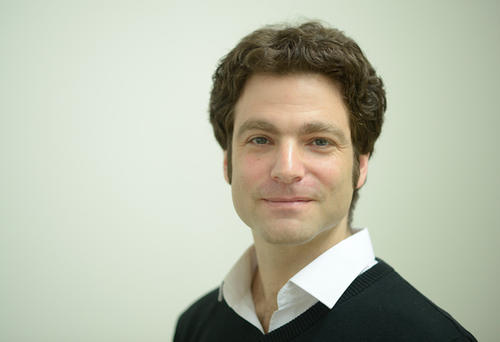Ofer Waldman
The Israeli musician is currently at Freie Universität working on his dissertation on Jewish writers in the GDR.
Apr 30, 2015
Ofer Waldman, who is from Israel, is earning a doctorate in literature.
Image Credit: Bernd Wannenmacher
“Music is for the heart – academia is for the mind,” says Ofer Waldman when he is asked why he has placed his career as an orchestral musician on hold. “I ordered a break for myself out of respect for music,” he says.
The hornist, who holds a Diplom degree, is currently working on his dissertation at Freie Universität Berlin, on Jewish writers in East Germany. There has been little research on this topic to date in Israel, where Waldman is earning a doctorate at the Hebrew University of Jerusalem. “In Israel, Germany is still most often viewed as being synonymous with West Germany, the old FRG, where most of the Israeli scholars of German language and literature or historians who are teaching today got their education,” Waldman explains. His work takes up the question of whether, and if so how, a specifically East German Jewish identity formed. To find out, he is studying literary texts by Thomas Brasch, Barbara Honigmann, and other writers.
Waldman explains that West Germany and East Germany each had their own way of coming to grips with – and here he cites Brasch – the “pan-German tragedy.” The Auschwitz trials and the TV series Holocaust dominated the public discourse in West Germany, but not in the German Democratic Republic. And that, Waldman says, has had consequences reaching right up to the present day, as he knows from personal experience.
The idea for his dissertation came to him while he was working in former “East” and “West” orchestras, playing music side by side with colleagues who had grown up in either East or West Germany. Even then, more than 15 years after the Berlin Wall came down, the differences were still noticeable. Now he plans to dedicate himself to this chapter in the history of the two German nations from an academic standpoint.
Waldman’s own background may allow him to view this history from a certain distance. His grandparents emigrated from Eastern Europe to Palestine, where his parents were born even before the Israeli nation was founded.
It is also possible that the time he spent as part of the West Eastern Divan Orchestra headed by Daniel Barenboim has given him a particularly keen sense of these kinds of nuances. He traveled to Germany with the orchestra, which was made up of young musicians from the Middle East – from Israel and Arab countries – in 1999. “Barenboim changed my life,” he says emphatically, “and the lives of a whole generation of musicians from the Middle East.” Waldman still gets goose bumps to this day when he thinks about the orchestra.
The conductor was “in a class of his own” as both a person and a musician, Waldman says. He felt that he was living out a fairytale, with nightly concerts with Barenboim, Yo-Yo Ma, and other musicians from world-renowned orchestras as well as engaging in political discussions. He came into contact with colleagues from Syria and Lebanon, people that he could never have met in Israel – “except as a soldier on the other side of the border,” he adds ironically.
Barenboim was also the person who asked Waldman whether he wished to study horn in Berlin and helped make sure Waldman would be released from military service in Israel early. Waldman was admitted to the Berlin University of the Arts – which also brought him “unimpeded access to the State Opera, all the rehearsals, all the performances.”
After he earned his degree, Waldman was hired as an orchestral musician, first with the Radio Symphony Orchestra Berlin and Nürnberger Staatsoper (Nuremberg State Opera) and finally back in his home country of Israel, where he blogged about the local situation for his friends from 2009 to 2012.
Waldman, now a father of two girls, wrote blog posts about the political situation, shared recipes for home cooking, and described everyday family life during the first Gaza War. His blog readership grew, and Waldman was cited as a “different Israeli voice” in various media. Today he is happy to be back in Berlin with his family – and not only because of the libraries and archives, which are important to his work. Berlin “as a place and a way of life” has become his home by choice, Waldman says.
Further Information
This text originally appeared in German on April 18, 2014, in the Tagesspiegel newspaper supplement published by Freie Universität.

